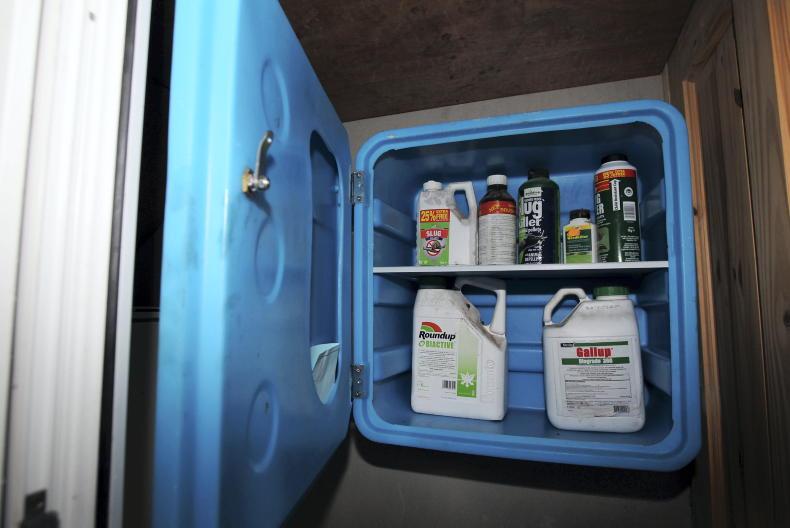Last week’s Irish Farmers Journal front page sent a shiver down my spine. I’m sure it did the same to every tillage farmer in the country.
The idea that all pesticides could be prohibited under the next sustainable use directive (SUD) in as little as 14 months would transform the economics of what I do.
I’m not sure there would be any hope of viability in crop production if such a sudden and profound change was imposed in so short a timeframe.
And I knew this story was coming, although I was sketchy on the details.
Illustration
Andy Doyle, our tillage editor, had shared the basis and outline of the story as we planned the paper prior to publication.
I can’t imagine how stunned someone who unsuspectingly picked up their copy of the paper felt, or indeed anyone who scrolled the epaper on Wednesday evening.
Perhaps the best illustration of how shocking this story is to farmers is the lack of reaction in the days that followed.
That is not normal - farmers are usually pretty quick to react to something they perceive as a threat.
Just look at the response to the decision of Dublin’s Lord Mayor not to have a live crib with animals outside the Mansion House this year for a more typical farmer response.
I think it’s important to try to make some sense of the dynamic at play here
I put this down to part incomprehension and part shock. Shock that this is being contemplated and incomprehension that anyone could consider this rational and worthy of committing to paper.
A week on, I think it’s important to try to make some sense of the dynamic at play here, and the logic behind it. What exactly is the draft of the SUD proposing, and why?
Is it a ban on all pesticides and could it be in place by 2024? The answer is a little complicated.
Exact wording
The exact wording is that “a 100% reduction” in pesticide usage is proposed for nitrates vulnerable zones. If a footballer is given a suspension from 100% of matches for a year, they are basically banned from all competition for that period. So it's a complete ban in all but name.
But will that ban be in place in little more than a year? Probably not. The wheels of the EU’s political machinery often move slowly.
What is true is that the envisaged timescale for the next iteration of the SUD, which governs all pesticide use, is for the new legislation to be in place and agreed for 2024.
Realistically, there isn’t a snowball’s chance in hell of this draft being law by then. But there will be an agreed SUD someday, and I and all EU crop producers will have to abide by it.
Why do I say it will be delayed with such confidence? Because the change it posits is so radical that it will be politically very divisive, both in the parliament and the Council of Ministers.
Substance of the proposal
Not everyone is a tillage farmer, or even a farmer, but this proposal will affect everyone, whether it is adopted, watered down, or utterly rejected, so allow me to explain a few of the basics, if I may.
Firstly, we can broadly divide chemical pesticides into three groups. Each of them is fairly self-explanatory. Insecticides target insects, herbicides target plants, and fungicides target fungal infections.
Why do we need them? Well, in Ireland, we have a remarkable capacity to grow high-yielding crops. Our summer days are long, our mild climate gives us a long growing season.
The lack of frost allows early planting of many crops. But our warm, often wet, and usually humid climate means that weeds grow fast, insects are on the move, and fungal infections affect our growing crops.
Protection
And we protect our growing crops with pesticides, but not just with pesticides. All farmers are required to adopt integrated pest management (IPM).
The basic philosophy is that chemical intervention is a last resort, not a knee-jerk reaction to any present or perceived threat to a crop.
IPM firstly involves crop selection. Then, within a crop, the variety should match the site and circumstances. Weeds can be encouraged by stubble and stale seedbed cultivation.
I know there are organic producers who are successfully working away without pesticides, and I admire them greatly
All this is good and all this is necessary. But we are a long way from developing IPM systems that will protect our crops without the use of pesticides.
If we prohibit their use entirely, we can expect a dramatic change in the yield and quality of our crops.
We are learning that some plant protection products, which is the polite term for pesticides, are not necessary for some crops in some locations. At home, we are happily planting barley, oats and beans without any insecticides.
However, growing fruit and vegetables without insecticides is not easy.
I know there are organic producers who are successfully working away without pesticides, and I admire them greatly. But that doesn’t mean we can all give up the can without consequences.
Supporters
Firstly, even the biggest supporters of organic production will admit that yields will suffer. And that may not have consequences if I switch and experience a 30% or 50% drop in yields, but if that happens all over Europe, it will matter. It will matter a lot.
Many proponents of the EAT-Lancet philosophy will say we all need to switch to a non-meat diet, with organic production of crops for human consumption replacing pesticide-and-fertiliser-assisted production of crops for animal consumption.
It’s a concept that may seem attractive. I would have a lot of concern that this vision does not take human nature into account.
We don’t lightly give up our comforts. Gunhild and Petter Stordalen, who fund the EAT foundation, and Formula One driver Louis Hamilton may have eschewed meat for the vegan diet, but I notice that they have held on to their private jets. Swings and roundabouts, people.
The reality is that a change to a non-meat diet, driven by regulations that dramatically alter the economics and yield potential of production, would be the greatest social experiment in human history. We have rarely seen such experiments turn out well. The horrific famines in Stalin's USSR were triggered in no small part by the forced collectivisation of farming. As the EEC moved toward the creation of the common agricultural policy (CAP) in the late 1950's, China's "Great Leap Forward" led to a famine that killed between 15-50 million people. Sri Lanka are currently coping with the fallout from last year's forced sudden transition to organic farming, with current food shortages expected to worsen before they improve.
Evolution not revolution
That doesn’t mean we can pile on regardless. Food production and food consumption must become more conscious. And this can be done in a thousand little ways. It’s not that complicated, but it usually means trying that bit harder.
For the farmer, it’s about putting IPM at the heart of every management decision, with the express aim of leaving pesticides in the chemical store unless there is no alternative. And that alternative must include accepting a slightly reduced yield.
For the consumer, it’s about shopping more carefully and minimising food waste. I know that shoppers, usually women who are balancing a lot of competing responsibilities, are stressed and pushed for time when they hit their local supermarket, but the choices they make over the half-hour they spend there really matter.
It’s no exaggeration to say that the future of the planet is at stake. Producers and consumers have a shared responsibility to help reduce the footprint of food production.
This responsibility is also shared by legislators. And that is why this SUD proposal exists.
However, I wonder if the person who drafted it realised that a 100% prohibition of all pesticides in a nitrates sensitive zone means a 100% prohibition in pesticide production across Ireland? And across several other large swathes of the EU?
It’s no exaggeration to say that the future of the planet is at stake
The Republic of Ireland in its entirety is classified as a nitrates sensitive zone. Maybe the author of the SUD was utterly aware of this, and wanted to send a sharp message that we can’t keep adding environmental stresses to nitrates sensitive zones.
Or maybe it’s a game of three-dimensional chess, where the real target isn’t pesticide usage, but the nitrates derogation, which allows some farmers to maintain an elevated stocking rate in exchange for closer scrutiny.
Ireland is one of only four countries in the EU to retain the derogation and the classification of Ireland as entirely nitrates sensitive is linked.
Or maybe the author of the SUD draft is siloed into their own area of expertise and has no inkling of the political or practical consequence of their proposals. Some would describe this as objectivity. I’d call it blinkered.
The European Commission isn’t a think-tank. It isn’t An Taisce, the IFA’s environment committee or the ERG.
Rather, it’s entrusted with proposing legislation to guide the world’s largest and most prosperous economic union to best lead the planet toward sustainability. Food production is one of the most challenging arenas within this political landscape.
Courage takes many forms
I am not going to rush to judgement in terms of this draft proposal. But I have a threefold stake in its outcome.
Firstly, as a food producer who is chemically dependant and aware of that, secondly, as a consumer of food and lastly, but most crucially, as a citizen of the EU who wants to see a safe future for myself, my children and future generations. But change must be manageable. We need to match prohibition of current solutions with real, alternative solutions.
We can’t simply return to the 1940s in terms of food production. Drivers aren’t being told that mechanised transport is being phased out, to get back to the bicycle and the donkey. Where is the electric vehicle solution for crop growers? We need to move forward from the pesticide era, not back to the time before it. If we take 1950 as the start date for significant fertiliser and pesticide usage, we should recognise that the global popuation has more than trebled in the seventy years since.
We need a couple of things urgently. Firstly, we can't afford to ignore transformative technologies, particularly gene-editing. This allows an accelerated selective breeding of crops to maximise resistance to threats and maximise varietal ability to absorb nutrients and water in more challenging climactic conditions, while under stress from threats no longer solved by chemical protection.
There is no doubt that NGOs warnings about climate change and environmental degradation, ignored for decades, are being proven right
That’s asking a lot of a plant, and it is perverse to hold our nose and pretend that it is doable without a lot of help. But the EU Commission seems much braver when it comes to confronting food producers about the impossibility of continuing as if it’s business as usual.
They are much more coy when it comes to confronting environmental NGOs about the hard choices we face in terms of harnessing CRISPR and other gene editing techniques.
I’m told such NGOs had a stronger consultative role in the drafting of this SUD than food producer organisations, who were largely ignored.
And there is no doubt that NGO's warnings about climate change and how human behaviour was damaging the natural world and threatening many species, ignored for decades, are being proven right. But, as I’ve said here before, correctly diagnosing the problem does not automatically mean you correctly deduce the solutions.
So, what happens next? Come 2024, I confidently expect to still be using pesticides. Not with any great enthusiasm - I’d much prefer if crops were evolved by the boffins to not need fungicides.
However, unless Europe wakes up to the need to adopt 21st century technology to solve 21st century sustainability issues, I won’t have much choice.
And the final SUD will ultimately also reflect this reality. It will have to.









SHARING OPTIONS